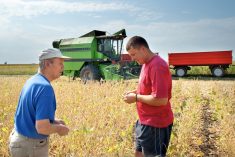“The seniors would like you to join them for their weekly gathering.” I am delighted to accept, especially when I am only expected to visit and have fun.
It is a warm afternoon in the pretty village of Endeavour, Sask., located where prairie meets parkland. I chat with folks outside the Seniors Centre until it is time to start. In the kitchen women are arranging pans of squares and baskets of cookies. A few women are having a “weigh in.” I am discretely directed away.
Read Also

The big squeeze: How to be fair to siblings during farm succession
Managing sibling business relationships on family farms.
Some men have started a game of cribbage. Musicians are tuning their instruments. The sing-along is accompanied by a keyboard, a violin, two guitars and an accordion. My favourite song is “The Hymn of Aging” sung to the tune of The Battle Hymn of the Republic. “We reach the age of 65. Our golden years are here… Our Canada Pension from Ottawa is sent…” An old timer says “What a wonderful country. You turn 65 and the government puts money in your bank account.”
The next day I attend a workshop on generational differences, hoping to learn how different generations approach life. The leader, Candice, was raised on a farm in southern Saskatchewan, surrounded by several generations.
She speaks from experience as well as research data. Candice tells me “You belong to the traditionalists.” She directs me to a discussion group with people who were born before or during the Second World War. We recall how ration cards controlled what our parents could buy. Most of our parents did not own cars. There were no television sets or ballpoint pens. Our grandparents usually lived nearby, and there was strong loyalty to church and to family. Candice says “The current generation of young people is totally connected by technology. Your generation developed friends close to home. Young people today travel, have an open world view and are part of vast virtual communities.”
On Monday morning I go for my western horsemanship lesson. My instructor, Joanne, says “You can toss the saddle on your horse from either side.” This does not seem right to me. I was taught to do everything around horses from the left. I brush my horse, put the saddle on and install the bridle from the left side. Candice is right. I am a traditionalist.
I discuss Joanne’s idea with Jim Cooper who ranches near Senlac, Sask. Jim is of my generation. He believes that a rider should only work from the left side of their horse. Old habits and convictions die hard. Patterns and practices we have developed over the years become entrenched. They determine what we are willing to do and not to do, sometimes to our benefit and other times to our detriment.
When Ian Tyson sings about “That damned old cowboy pride,” he is not just referring to people who ride horses. My sister says “Our new minister wants to make changes. Not everyone in the congregation is happy about it.” Why is change difficult for churches and church members?
Mark Lau Branson has written a book about congregational change. He says “People have more confidence in the journey to the future when they carry forward parts of the past.” He also says “If we carry parts of the past into the future, they should be what is best about the past.”
Not everything in the past was good. We are wise to leave it in the past. But much was good. We are wise to retain it and to pass it on to the next generation.
Suggested Scripture: Psalm 100, Ecclesiastes 1
Bishop Rod Andrews is with the Anglican Diocese in Saskatoon














